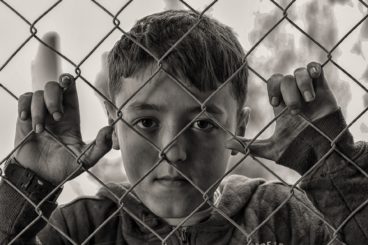What Every American Needs to Know and Can Do to Respond to the U.S. Border Situation

Thousands of people seeking asylum are continuing to camp just below the southern U.S. border, often fleeing violence and poverty. They are, like many who come to our country, in search of a better life.
Yet these ordinary people looking for safety, jobs, and opportunities have been villainized by some of our leaders and media outlets. They’ve been stereotyped as criminal leeches, as an invasion. And these narratives have been offered as legitimating stories for greeting migrants with tear gas and rubber bullets as they fled to our doorstep last Thanksgiving.
When ordinary people see the abuse these neighbors are enduring, it’s easy to feel helpless. Fortunately, we don’t have to feel that way. We’ve spoken with a few activists and advocates who are on the front lines of the border situation, asking them to answer two questions:
1) What do everyday citizens need to know?
2) What can we do to stand with the asylum seekers at our border?
Dr. Alexia Salvatierra (Matthew 25)
The families fleeing Central America are no different than refugees from any situation where terrible violence rules and is tearing apart the fabric of society. These are normal people trying to keep their children safe. Many fit our legal criteria for asylum/refugee status. All they are seeking is the opportunity to apply in a timely manner. Most are not rushing the border; they are waiting in line for their turn, believing that our democracy is their best chance for freedom and security.
There are three primary ways to help: 1) immediate financial assistance for food, tents, etc.; 2) immediate financial assistance for legal support; and 3) advocacy for federal resources for processing asylum claims in a more timely manner.
For advocacy, consider adding your name to the Central American Migrants Advocacy Statement. Al Otro Lado is an excellent legal support organization, and World Relief is also helping. Global Immersion, the Red Cross and World Vision all visit the camps and can provide humanitarian assistance. If your denomination has churches in Tijuana, many of the smaller churches are also helping with humanitarian assistance as well.
Jon Huckins (The Global Immersion Project)
For those of us who live at the border, this moment is unique, but not at all surprising. It’s unique in that the rhetoric around migration and migrants has led to much more attention to our border reality that ever before. It’s not unique in that “caravans” are not new. Whether it was the unaccompanied minors in 2014 or the Haitians in 2016 or smaller caravans last year, our border is a place where those on the move come to find life. Most out of desperation and a desire to simply give their children a chance at life.
The best way to support right now is to follow the lead of those on the ground, namely our Mexican colleagues who are giving themselves day in and day out for the flourishing of our migrant neighbors. They are organized, strategic, and compassionate, and have an eye toward the long term rather than a band-aid fix. We’d be wise as US Americans to listen, learn and partner with them in ways they best see fit.
Bethany Anderson (Solidarity in Orange County)
It’s important for Americans to understand the issue of Central Americans seeking asylum at our southern border is not something we can simply say is not our problem. The reason they are fleeing and seeking asylum in the US is directly connected to US foreign policy that has contributed to incredible instability in Central America. It is, in fact, a problem we helped to create and it is our responsibility to help solve it in a humane and just way.
As Christians, our loyalty is first to God and his people, no matter what country they are from. Many asylum seekers are fellow believers. We cannot pretend that their suffering does not impact us. One part of the body can not turn its back on another part and think there won’t be spiritual implications for this.
This is not only our responsibility as Christians and Americans, but it’s also an opportunity for us to more deeply align our hearts with God. For that, our posture should be one of gratitude and humility. These people are a blessing and should be treated as such.
Ways for people to support:
- Donate. There are a number of organizations working on the front lines, mine included. Here’s a quick list:
- Advocate. Call your representatives and ask them to use their influence to push the administration to increase the number of people admitted into the US every day seeking asylum, increase the number of judges processing asylum cases, work to pass comprehensive immigration reform that adheres to these values, and address the root causes in Central America that cause people to migrate.
- Educate. Educate yourself on the realities of immigration.
 Andre Henry holds a B.A. in Practical Theology and an M.A. in Theology with an emphasis in Biblical Languages. He’s passionate about music, faith, racial justice, and social change. Follow him on Twitter @andrehenry.
Andre Henry holds a B.A. in Practical Theology and an M.A. in Theology with an emphasis in Biblical Languages. He’s passionate about music, faith, racial justice, and social change. Follow him on Twitter @andrehenry.


